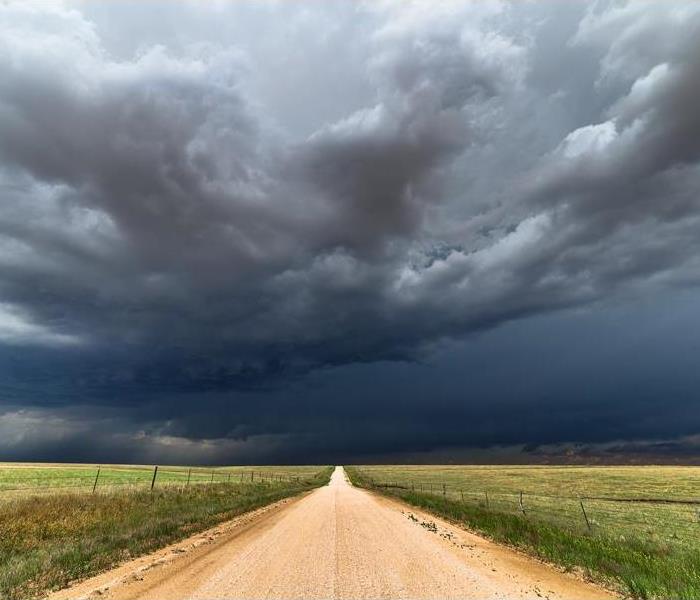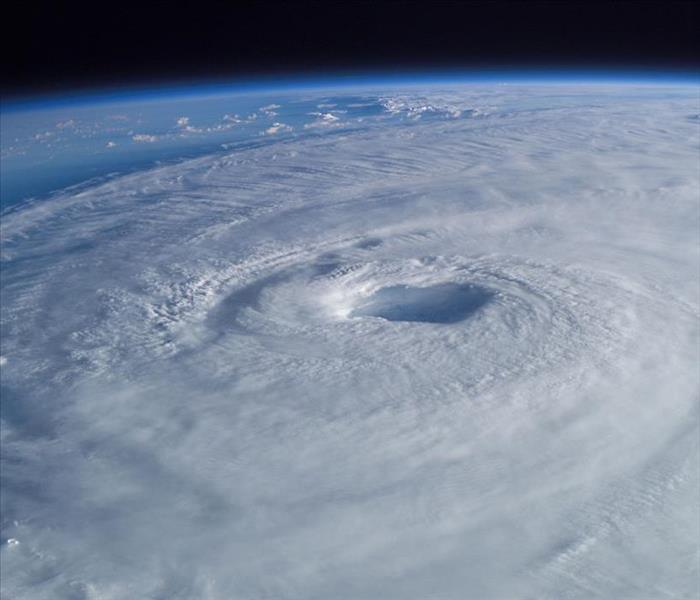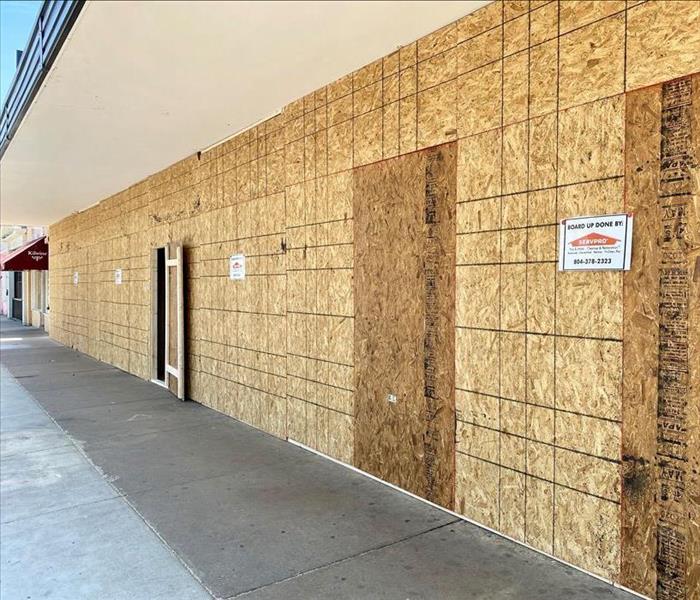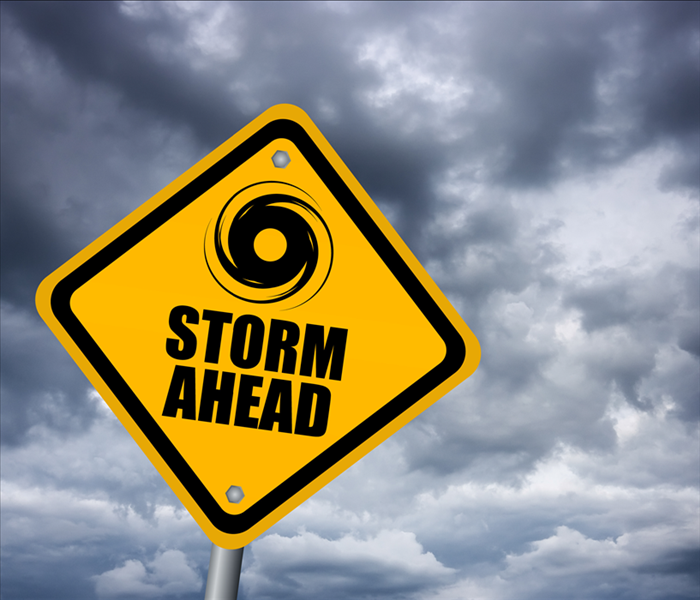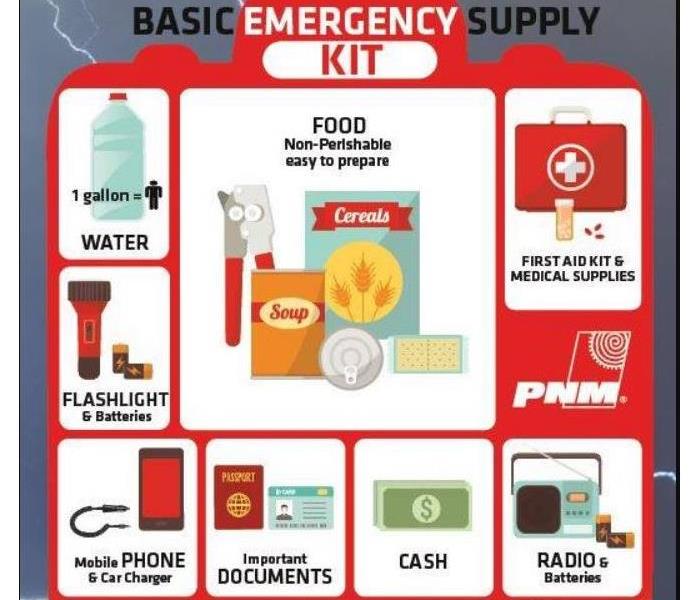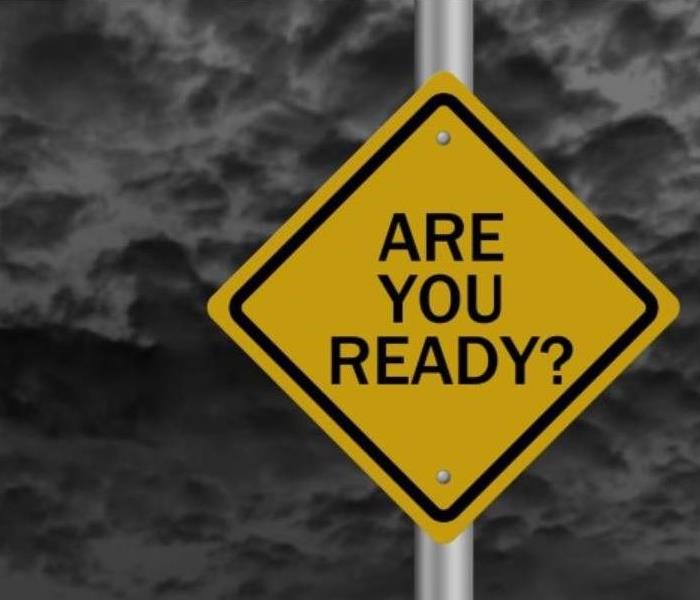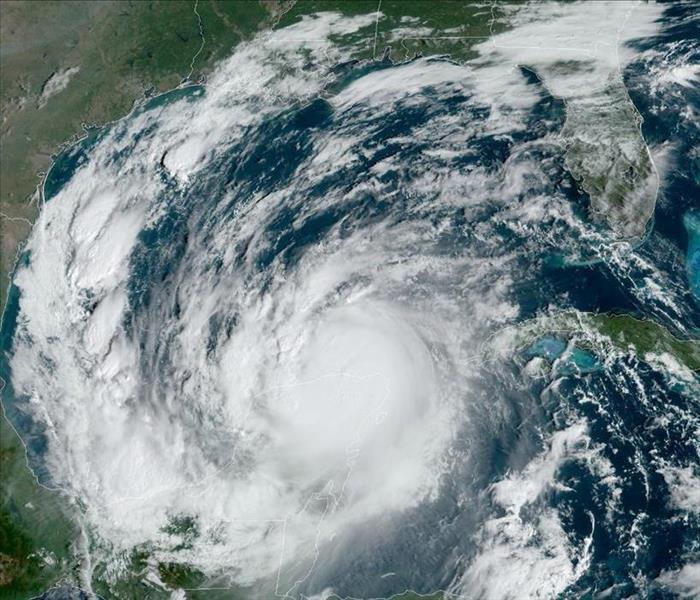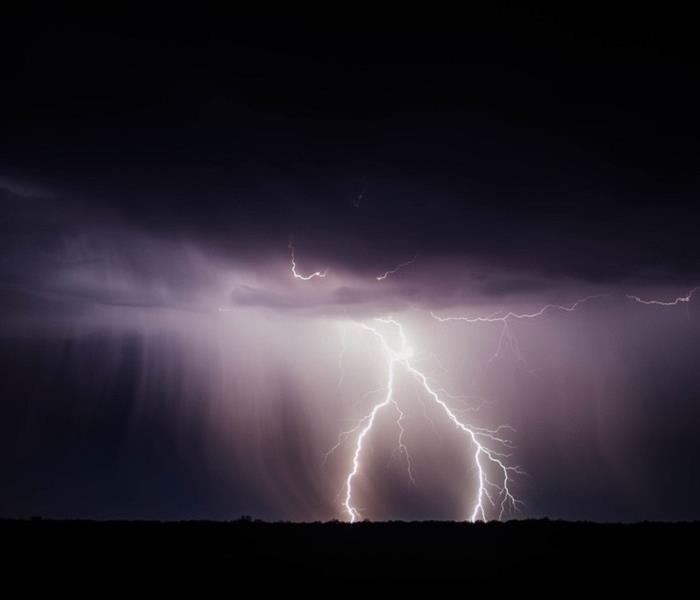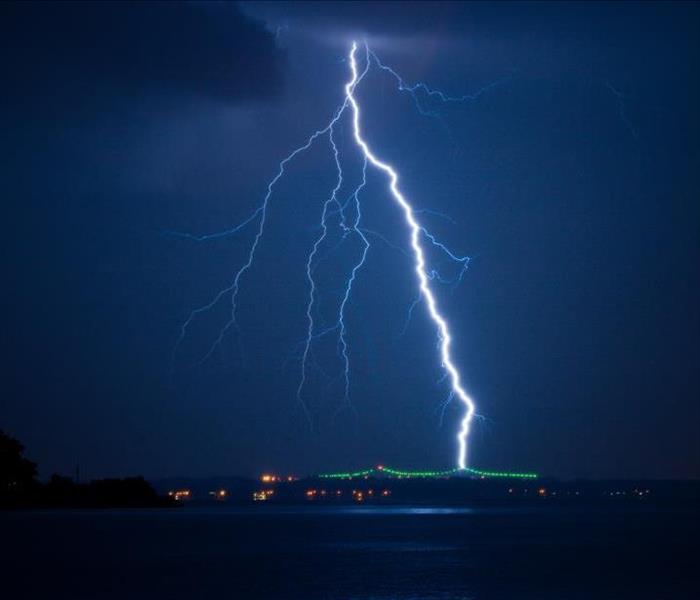Recent Storm Damage Posts
Storm Readiness 101
7/18/2024 (Permalink)
As leaders in the restoration industry, we know firsthand the amount of damage that a storm can do to your home. Addressing the damage as quickly as possible is key to preventing further damage from occurring. We wanted to share some of the most important areas of your home that can be affected by storm damage, so you know where to check afterward.
- Basement – Areas of your home that are underground are some of the spots that are the most prone to water damage following a storm. Check around the edges of your basement floor and walls for signs of moisture. Make sure that drain spouts are properly angled away from your home and that there are no areas where water can pool next to your house.
- Foundation – Similarly to basements, your home’s foundation is particularly threatened by water damage after storms. Water from the outside can seep into cracks in your foundation and weaken it over time. Double-check check there is no standing water or signs of moisture in your concrete, and make sure that your sump pump is functioning properly.
- Crawlspaces – Water can pool in areas underneath your home and cause significant damage to the structural components, like mold and rotting wood.
- Windows – Over time the seals on your windows can degrade and strong storms can crack windows and window frames, allowing water to get into your home.
- Roof – Probably the most prone to storm damage, wind can damage shingles and throw broken tree branches all over your home. As one of the main sources of protection from the outside elements. It is crucial to inspect your roof after a storm. Ensure there are no leaks and remove any debris that could further damage your home. Check for any signs of moisture in your attic as well as this could be a sign that there is a hole somewhere you might’ve missed.
- Gutters – Strong winds and falling branches can damage your gutters or even completely rip them off the side of your house. Your gutters are essential in preventing water from getting into your home and directing it away from your home’s foundation. Make sure that your gutters are in good condition and free from any debris that may clog them.
While storm damage may not always be 100% preventable, hopefully, these tips can help you prevent any further damage from happening, and if you do happen to find any signs of damage to your home after a storm. Our technicians are here to help. We’re available 24/7, 365 days a year, so don’t wait, give us a call and let us know what we can do for you.
Hurricane Season is in Effect
9/20/2022 (Permalink)
Hurricane Season is Still in Effect!
It’s important to follow these steps to ensure you are taking the proper precautions in case of an emergency.
- Develop an Evacuation Plan - find out if you live in a hurricane evacuation zone and plan where you and your family will go and how to get there. Make sure you keep your pets in mind when you’re preparing to evacuate.
- Gather Disaster Supplies - get enough food and bottled water for each person in your group or for at least one week. Fill prescriptions ahead of time and collect radios, batteries, phone chargers, extra cash, and gas up your car.
- Check Your Insurance - get with your insurance agent before the storms hit to discuss flood insurance. Prepare your home and vehicles according to your policy and locate all important documents.
- Strengthen Your Home - trim trees that could cause damage, seal and cover windows, store loose outdoor items
Help Your Neighbors - help your neighbors, especially the elderly ones collect needed supplies and assist them with evacuation. Check in on them after it’s safe.
Know Your Clouds
11/3/2021 (Permalink)
Do you know that there are over 100 different kinds of clouds? All of these can generally be put into ten basic types:
- Cumulus – These are the clouds you learned how to draw as a kid with flat bottoms and big puffy tops, typically seen on sunny days and often nicknamed the “fair weather cloud”
- Stratus – Stratus clouds form a greyish uniform layer, low in the sky, and kind of look like fog but in the sky instead of on the ground. These clouds are mostly seen on overcast days and can bring mists or drizzles.
- Stratocumulus – Think of a stratus cloud but split it with a knife so that the blue sky shows through. These clouds are seen on “mostly cloudy” days
- Altocumulus – These are the most common clouds in the middle of the atmosphere. They form big, round masses in bands across the sky and can be white or grey. Typically, you can see these clouds on warm, humid mornings and they can signal future thunderstorms or the onset of cooler weather
- Nimbostratus – This is the cloud that brings the rain. You’ll see these clouds form a dark grey layer over the sky whenever there’s a steady rain or snow
- Altostratus – Grey sheets of clouds covering the whole sky where you can typically still see the sun shining through. These clouds can signal a coming warm front or when paired with cumulus clouds, a cold front.
- Cirrus – These clouds are the wispy white clouds that look almost like curls of hair (hence the name which is Latin for “curl of hair’). Typically, they’re seen during fair weather but can also form ahead of large-scale storms. Sometimes these clouds are also referred to as “mare’s tails”
- Cirrocumulus – Patches of clouds arranged in rows, high up in the sky. There is not much moisture high up in the sky so these clouds are made of ice crystals! These clouds are nicknamed “mackerel scales” because of the look they give the sky why they appear.
- Cirrostratus- These are the translucent clouds that appear across the sky when there is a lot of moisture present in the air high in the atmosphere. They can be identified by the halo effect they have around the sun or moon that’s formed by the light refraction in the ice crystals of the cloud
- Cumulonimbus – These clouds look similar to the cumulus clouds they are formed from but are much taller with often flattened tops and dark bottoms. These are thunderstorm clouds, and signal nearby severe weather.
Clouds can play a big part in being able to predict what kind of weather is headed your way! For example, there’s an old sailors’ phrase “Mares’ tails and mackerel scales make ships take in their sails.” This means that if you see Cirrocumulus and Cirrus clouds that could mean a warm front is approaching which brings in precipitation, so sailors used to use this as an indicator to prepare the ships for rough seas.
Next time you go outside take a look up at the sky and see if you can figure out what kinds of clouds are up there and if you see “mares’ tails” and “mackerel scales”, just know we saw them too! And we’re ready by the phones should your home or business suffer from any water damage because of the storms. So give us a call and trust is to make it “Like it never even happened.”
SERVPRO's Emergency Services
11/1/2021 (Permalink)
When you call us here at SERVPRO of Elizabeth City/Outer Banks we’ll ask if you need emergency services, but what does that mean to you?
Emergency services are preemptive measures that our team can take quickly to help mitigate any further damage from happening before the actual cleanup and recovery efforts can begin. These services include:
- Board up services – If any sort of damage from wind, fallen trees etc. has affected your house we will come put up boards and plywood to seal any unintentional holes in your property to the outside
- Roof tarps – Similar to board up services but for your roof, fallen trees can make holes and winds can rip up shingles leaving your home potentially exposed to the rain and animals until it can be fixed
- Extraction – This is the removal of all surface water left in your property, without this standing water can penetrate surfaces and cause further damage to the building.
- Muck-Out – After extraction there can be debris, mud, and anything else left behind by the dirty water that was just extracted. We have multiple different strategies for the removal of the debris as fast as we can.
Emergency services allow us to help ensure that your property does not suffer from even further damage than it already has. It’s important because the faster you can stop the damage from spreading the less time it will take to get restored and the more money you will end up saving in the long run.
How to Prepare for Hurricane Season
8/10/2021 (Permalink)
Now is the time to star preparing your households for the upcoming Atlantic hurricane season. The height of the storms will form between the months of August and September, and will produce strong storms with heavy winds and rains that could cause damage to your home. And according tot he National Oceanic Atmospheric Administration, this year's hurricane season will be above-average, meaning more storms than normal.
Follow these tips to make sure you are fully prepared for when hurricanes strike:
- Gather Supplies - make an emergency kit that has essentials like bottled water, medication, and first aid kits
- Help your Neighborhood - seniors and elderly neighbors may need help gathering supplies
- Strengthen your Home - clear out gutters and collect lawn furniture
- Make an Emergency Plan - discuss with everyone in your home what to do in case of an emergency and practice it.
- Recognize Warnings and Alerts - download the FEMA app to get real-time alerts on how to handle the storm
- Know your Evacuation Zone - listen to local officials on where you need to escape from
- Review Important Documents - check your insurance policies and buy flood insurance if you think your home is susceptible to flooding
Do You Have a Power Outage Kit at Home?
11/5/2020 (Permalink)
The American Red Cross suggests that every household have an emergency preparedness kit for your home and for your car. Unfortunately, only a little more than a half of the homes in the U.S. have an emergency kit.
Your power outage kit can start with a duffle bag or a backpack. Depending on the situation, the kit can be a 3-day supply for an evacuation or a 2-week supply for home. The kit should include:
- at least a gallon of water per person/per day
- canned food
- a can opener
- flashlights
- batteries
- a first aid kit
- personal hygiene items
- a multi-purpose tool
- medications
- copies of personal documents such as proof of address, deed/lease, passports, birth certificates, and insurance policies.
- A printed list of emergency phone numbers and of family and friends.
We will continually bring you more tips and information on how to best be prepared in case of disaster. SERVPRO of Elizabeth City/Outer Banks is always ready and always here to help if you experience a water damage in your home or business.
SERVPRO Storm Preparedness
10/19/2020 (Permalink)
SERVPRO® of Elizabeth City/Outer Banks Encourages Coastal Carolina Residents to be Storm Ready.
Prepare and Protect Your Family
We are at the beginning of hurricane season on the Atlantic coast, and SERVPRO® of Elizabeth City/Outer Banks is hoping that everyone remembers the importance of disaster preparedness. The key to disaster preparedness is having an emergency plan in place before the disaster hits. Acting with a few simple steps can make the difference in protecting and keeping your family safe and protecting your property from weather related damage.
Build a basic emergency supply kit stocked with enough water and food for a minimum of three days for you and for each of your family members, pets included. Be mindful to include any necessary medications. Recommended emergency supply kit items include:
- Water (one gallon/per person/per day)
- Three-day supply of non-perishable foods
- Manual can opener
- Battery or solar powered radio, preferably a NOAA weather radio
- Flashlight with extra batteries
- Whistle (to signal for help)
- Dust masks or bandanas
- Local map
- Important documents, such as insurance policies, bank account information, passwords, and identifications
- Matches (in a waterproof container) and/or lighter
Make a Family Emergency Plan. A Disaster may not strike when you and your family are together at home. Plan now for a meeting place and how you will contact each other. Visit ready.gov to access a Family Emergency Plan template to help with your planning.
Stay Informed. Know your flood zone for your property and your neighborhood and know the evacuation route should evacuation become necessary. Listen to your local news and authorities for direction.
Prepare your property. You may need to prepare your home for the impact of a storm or hurricane. Covering all your windows in your home will help to protect it. Permanent storm shutters offer the best protection for windows; however, the second-best option is to board up the windows with plywood. Tape will not prevent your windows from breaking. Trim your trees and bushes that are around your home and clear any debris from rain spouts and gutters. Secure outdoor furniture, trash receptacles, decorations and anything else not secured that could become a projectile.
Establish a SERVPRO® Emergency READY Profile for Your Business. SERVPRO® developed the SERVPRO® Emergency READY Program to help business owners create an Emergency READY Profile® (ERP) for their facility, at no charge. The business owner works with SERVPRO® of Elizabeth City/Outer Banks to gather and document information that will become critical if a disaster strike. Once the ERP is created, business owners have access to their own information 24/7 online and by using SERVPRO’s free smartphone app. Contact us at 252-331-7889 to get set up.
Before The Storm
10/9/2020 (Permalink)
Hurricane Prep Guide
Getting prepared for a hurricane is not only about buying lots of water or filling up the gas tank. There are steps needed to help protect you and your family if your home is threatened by a hurricane.
Stock Emergency Supplies
- Water & Food at least a 3-day supply for you and your pet
- Tools like flashlights, extra batteries, a wrench, plastic sheeting & duct tape, trash bags
- Medical Hygiene and Cleaning Supplies like a first-aid kit, necessary medications, glasses, contact lenses, moist towelettes, toothpaste, and personal hygiene products
- Personal Items, like sleeping bag for each person and change of clothing
- Activities like books, games, playing cards, paper, pencils and pens
- Radio for NOAA weather radio with tone alert and extra batteries
- Other Items like a whistle to signal for help
Prepare and Protect Your Property
- Do a Home Inventory with contents of closets, drawers and cabinets? Store your home inventory lists, photographs and video tapes in a waterproof place off the premises. Keep receipts of high valued items, which may separate insurance coverage. Always update your home inventory after making large purchases.
Review Your Insurance Policies
- Is everything up to date? If you’ve done any major renovation or made a major purchase, make sure your insurance agent is aware to help determine if your current limits are enough to cover the value.
- Coverage for additional living expenses in case you can’t live in your home until it has been restored from damages.
- What about flood damage? Do you have coverage?
- Do you have comprehensive coverage on your car insurance policy? What happens if a tree falls on it or water, wind or flying debris damages your car?
Plan Your Evacuation
- Become familiar with alternate routes in case travel becomes treacherous or traffic congested
- If you don’t have a car, plan on how you will leave if you need to evacuate; make plans with family or friends or your local government or aid agencies
- Plan what you will do with your pets, leave them with family, take them with you or to a kennel
- Keep a road map in your car in case you need another route on unfamiliar roads
- Prepare a bag or file with important papers, like your homeowner’s insurance policy, keep it with you.
If you have suffered water damage after a storm, SERVPRO of Elizabeth City/Outer Banks is prepared to assist you after the storm to clean up the mess and help restore your home to its pre-storm condition. Call us at 252-331-7889.
Spring Storms
1/23/2020 (Permalink)
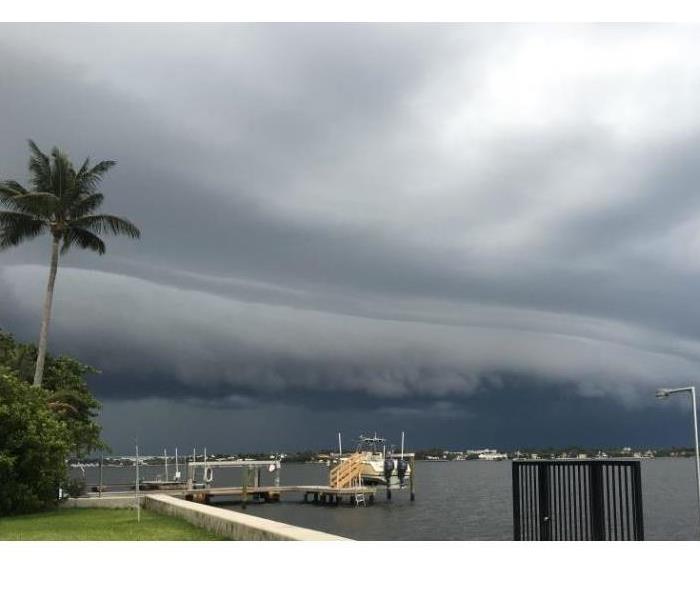 Changing weather during the spring can cause potential hazards that can be hard to predict/plan for.
Changing weather during the spring can cause potential hazards that can be hard to predict/plan for.
Spring weather is notoriously unpredictable! There are days where it feels like summer has arrived and then other days where we may even see snow!
Changing weather during the spring can cause potential hazards that can be hard to predict/plan for since the weather can change rapidly, leading to the experience of many seasons in the same day! Mark Twain once said, “In the spring I have counted one hundred and thirty-six kinds of weather inside of four and twenty hours.”
Thunderstorms pose the most serious weather related threat during the spring. Thunderstorms develop when warm moist air collides with cool, dry air. Some of the dangers associated with severe thunderstorms include lightning, tornadoes, and flooding. Although the weather in the spring can change so quickly there are something you can do in order to prepare. Having a first aid kit and an emergency evacuation/shelter plan as well as keeping a 3-5 day supply of water and non perishable food are all measures that can be taken to prepare for the potential of severe weather in the spring.
If your home or business experiences storm damage this spring, we are Here to help! Our Disaster Recovery Team is ready 24 hours a day, 365 days a year to respond to any disasters that may strike in any season.
Before Winter Arrives. . . Don’t Let Pipes Freeze
12/4/2018 (Permalink)
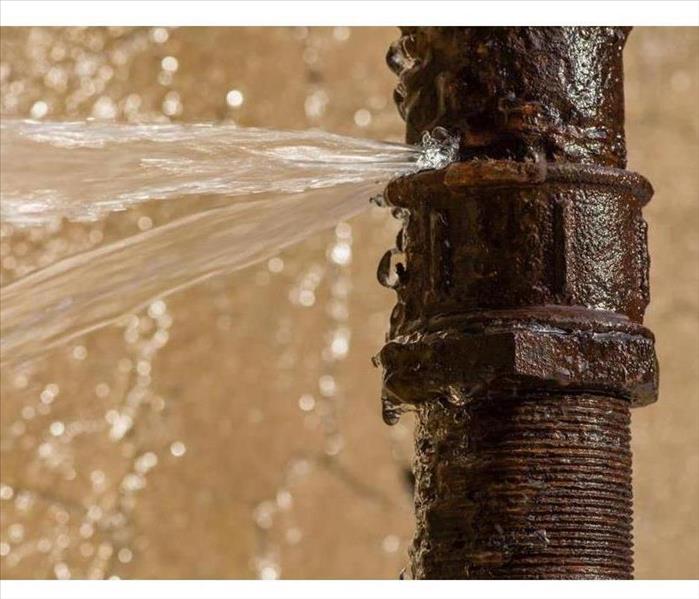 Water pipes freeze in Elizabeth City/Outer Banks.
Water pipes freeze in Elizabeth City/Outer Banks.
Before Winter Arrives. . . Don’t Let Pipes Freeze
A major home maintenance disaster is bad enough in itself, but when several disasters happen all at once, well that’s a nightmare. Especially when your water pipes freeze because not only do you have to call a plumber, but that crack in your pipe can spew up to 250 gallons of water a day, causing flood damage, serious structure damage, and the immediate potential for mold damage.
The causes of frozen pipes are quick and sudden drops in temperature, poor insulation, and thermostats that are set too low. Now is the time when the temps are warmer to prepare your home and here are a few preventive precaution steps.
- Insulate your pipes in your crawlspace and in your attic. Exposed pipes are vulnerable, and the more insulation, the better.
- Use approved and tested insulation products for use intended, either indoors or outdoors and make sure to follow the manufacturers’ instructions.
- Seal those leaks near or around the pipes. Electrical wiring outlets, dryer vents, and pipes can be caulked or insulated to keep out the cold air. The least little opening during severe cold weather can cause a pipe to freeze.
- Disconnect garden hoses before winter and if you can drain water from indoor pipes that lead to outside faucets and shut off the valve. This can help prevent that little bit of inside pipe from freezing.
If you have water or flood damage, call us at 252-331-7889, Your 24Hr. Emergency Service.
Hurricanes. . . Plan Ahead
9/7/2018 (Permalink)
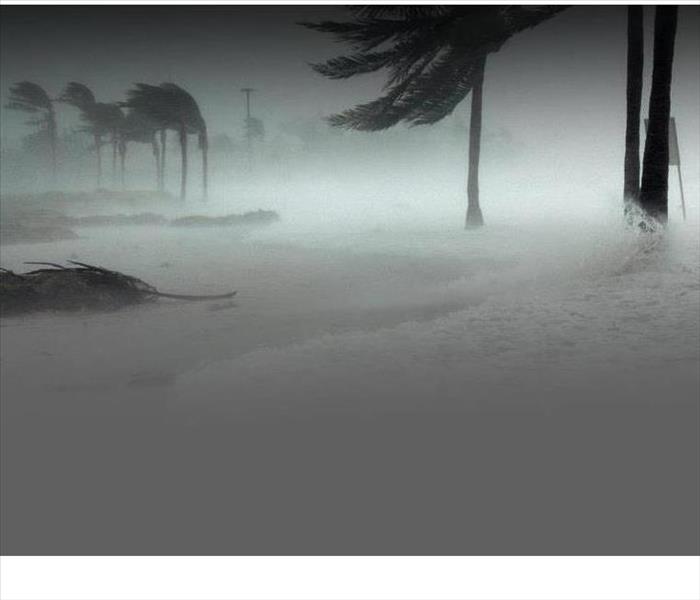 Hurricanes. . . Plan Ahead
FEMA News Photo
Hurricanes. . . Plan Ahead
FEMA News Photo
Hurricanes. . . Plan Ahead
Hurricanes are huge storm systems that form over warm ocean waters. These systems move towards land with threats of powerful winds, heavy rainfall, storm surges, coastal and inland flooding, rip currents, landslides and tornadoes. The Atlantic hurricane season runs from June 1 to November 30. Hurricanes are most active in September.
- Remember that if you are under a hurricane warning, you should find shelter sooner rather than later to protect yourself from high winds and flooding. You should evacuate if you are told to do so. If you must take refuge, you should do so in a storm shelter, or an interior room for high winds. Make sure you have a way to receive and listen for emergency information and alerts. Use a generator outdoors only and away from windows. #FloodSmart turn around, don’t drown! You shouldn’t walk, swim, or drive through flood waters.
Plan Ahead
When a hurricane is 36 hours from arriving
- Turn on the TV or radio to get the latest weather updates and emergency instructions.
- Restock your emergency preparedness kit, and include food & water enough for at least three days, medications, a flashlight, batteries, cash, and first aid supplies.
- Prepare to use your family communication plan if you lose power. For example you can call, text, or email or use social media. Remember that during disasters, sending text messages is usually more reliable and faster than making a phone call.
- Know and review your evacuation route and shelter locations with your family as you may have to leave quickly.
- Keep your car in good working condition with a full tank of gas, emergency supplies and extra clothing.
Next: Plan Ahead. . . When a Hurricane is 18 -36 hours From Arriving
Be Prepared North Carolina-Get a PLAN
6/4/2018 (Permalink)
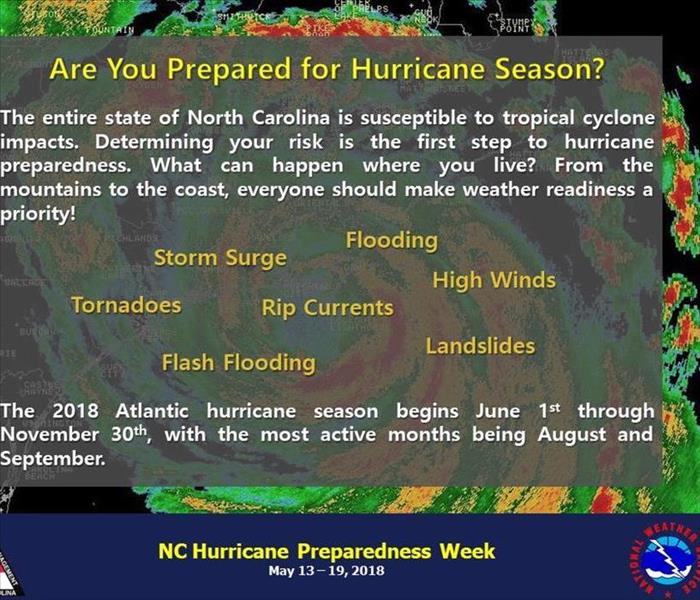 Determine Your Risk
Determine Your Risk
In 2017, many regions suffered through nightmarish scenarios from multiple hurricanes. Your local North Carolina government says that you should not only have an emergency plan for disasters, but a plan for hurricane evacuations.
Evacuation plans should include what route you will take, what vehicles you will use, and where you will stay.
Your local emergency management has the ability to send emergency alerts to residents, visitors and property owners via text, email, and over the phone.
What Your Should Know, What You Should Do Outer Banks
"Hurricanes cause high winds, tornadoes and landslides, but their deadliest hazard is flooding. Tropical storms and depressions can be just as dangerous."
Know your flood zone
Your local planning department can help you to determine the flood zone of your property or obtain information on historical flooding in your neighborhood.
Weatherizing Around Windows and Doors
2/2/2018 (Permalink)
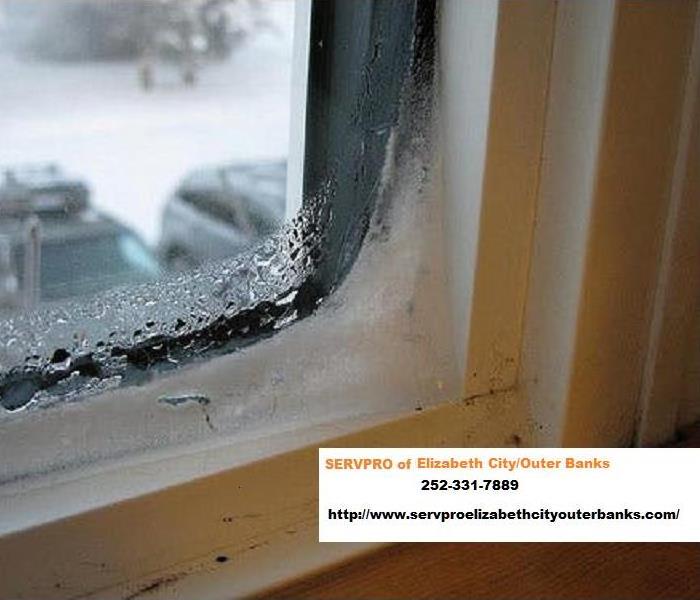 SERVPRO of Elizabeth City/Outer Banks
SERVPRO of Elizabeth City/Outer Banks
Weatherizing Around Windows and Doors
Are you feeling a draft even though your windows and doors are closed? Chances are that you need to add or replace the seal on the windows or replace the weather stripping around the doors.
Conducting a maintenance check or inspection of your home can help minimize the risks for potential damage caused from extreme cold temperatures or winter storm conditions.
You want to caulk around cracked window seals, replace any broken windows and add weather stripping or caulk to loose window panes. The diy network offers tips on weatherproofing doors and windows.
Should water damage occur due to extreme weather or something else, give us a call, we’re your 24/7 Emergency Service, SERVPRO of Elizabeth City/Outer Banks at 212-331-7889. #SERVPROOBX #LikeItNeverEvenHappened
Winter Weather
12/18/2017 (Permalink)
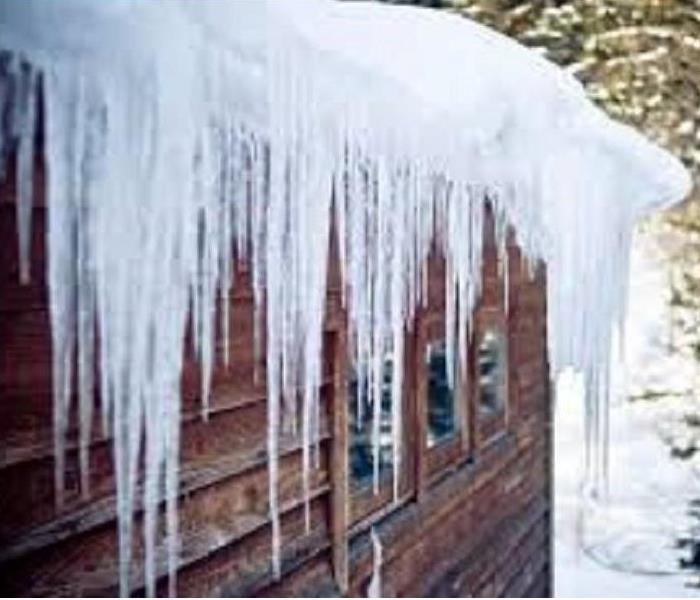 SERVPRO® of Elizabeth City/Outer Banks at 251-331-7889
SERVPRO® of Elizabeth City/Outer Banks at 251-331-7889
Ice dams can be a major problem during the winter season. Cold weather, snow and ice storms can cause severe damage to your home or your office.
Ice dams form when the heated air melts the roof snow downward and the melted water runs into ice that is still frozen causing the water to dam up. When this water is trapped, it can not flow or run into the gutter system and can backflow under the roof shingles and into the interior structure of your house or business.
Ice Dam damage:
- Water can seep into your home or building’s walls, ceilings, insulation and other interior areas.
- Ice dams can lift roof shingles causing water to leak inside your home.
- Pressure and weight from the dams can pull off your gutters and lead to structural damage.
Our friends at Nationwide blog about Preventing Ice Dam Damage to Your Roof and Home.
If this disaster strikes, you need to take immediate action to prevent additional damage to your property. SERVPRO of Elizabeth City/Outer Banks franchise professionals have the winter storm experience and expertise, and the resources to remediate damage caused by winter weather.
Prepare Your Home
12/15/2017 (Permalink)
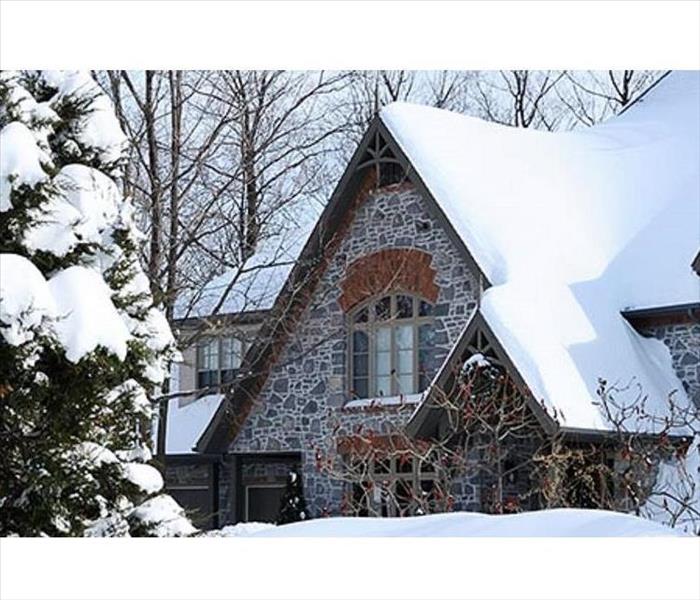 SERVPRO of Elizabeth City, Outer Banks 252-331-7889.
SERVPRO of Elizabeth City, Outer Banks 252-331-7889.
Prepare Your Home
Tips for Preparing Your Home for Winter Weather
- Keep your cabinet doors open during cold spells as this will allow warm air to circulate around the pipes.
- Keep a slow trickle of water running through your faucets, especially those that run through unheated or uninsulated areas of your home.
- Consider shutting off your outdoor faucets. Find the shut-off valve in the basement or crawl space and turn to “off.”
- If you do shut off your outdoor faucet, then open the outdoor faucet to help ensure it drains completely and the inner valve is shut off.
- Ensure that your gutters are clean and in good shape, secured. Leaves and such can clog and cause a damming effect which could lead to roof problems and water damage.
- Proper maintenance of your furnace, HVAC system can help reduce the risk of puffbacks.
SERVPRO of Elizabeth City, Outer Banks has been serving the community since 1967. We specialize in storm damage restoration. Our crews are highly trained, and we use specialized equipment to restore your property to its pre-storm condition.
Winter Weather Alerts
12/11/2017 (Permalink)
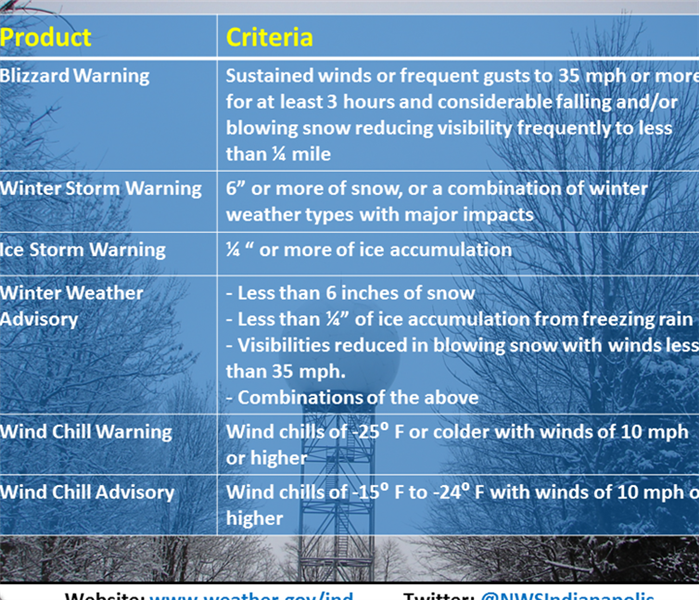 SERVPRO of Elizabeth City, Outer Banks 241-331-7889.
SERVPRO of Elizabeth City, Outer Banks 241-331-7889.
SERVPRO of Elizabeth City, Outer Banks wants to help you to be prepared for the upcoming winter weather. The National Weather Service will issue advisories and warnings. It is important that you understand these and know how to prepare for winter and to be Winter Safe.
- Blizzard Warning- Winds or gusts to 35 mph or more for at least 3 hours and lots of falling or blowing snow reducing your visibility to less than ¼ mile.
- Winter Storm Warning- 6” or more of snow, or a combination of winter weather types with major impacts.
- Ice Storm Warning- ¼” or more of ice accumulation.
- Winter Weather Advisory- Less than 6” of snow, Less than ¼” of ice accumulation from freezing rain, Visibilities reduced in blowing snow with winds less than 35 mph, Combinations of these.
- Wind Chill Warning- Wind chills of -25°F or colder with winds of 10 mph or higher.
- Wind Chill Advisory- Wind chills of -15°F to -24° with winds of 10 mph or higher.
SERVPRO of Elizabeth City, Outer Banks has been serving the community since 1967. We specialize in storm damage restoration. Our crews are highly trained, and we use specialized equipment to restore your property to its pre-storm condition.
Power Outage Gadget Picks for Elizabeth City/Outer Banks
9/13/2017 (Permalink)
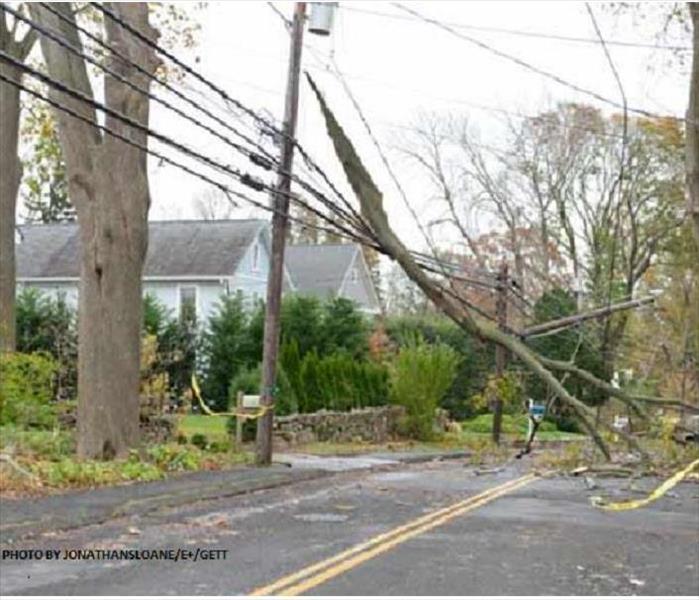 Power lines taken out by a tree.
Power lines taken out by a tree.
More than 60% of power outages are a result of stormy weather and your best defense against the dark is to have on hand power outage gadgets at home or the office.
Our friends and experts #ThisOldHouse have compiled a list of handy power outage essentials that will help you and your family or employees get through the night without leaving you feeling so . . . powerless.
Essentials such as an All-Weather Radio that bests your smartphone using three different power sources, a Cell Phone Charger that juices up with a manual crank or hold a charge for a full year, a Waterproof lantern made to brave the worst of camping conditions, a tripod flashlight with gripping legs and magnetic feet. and last but not least, a plug-in lamp that turns on automatically when the power goes out, so you can see where you are walking.
When Storms or Floods Hit Elizabeth City, Outer Banks, SERVPRO is ready!
6/27/2017 (Permalink)
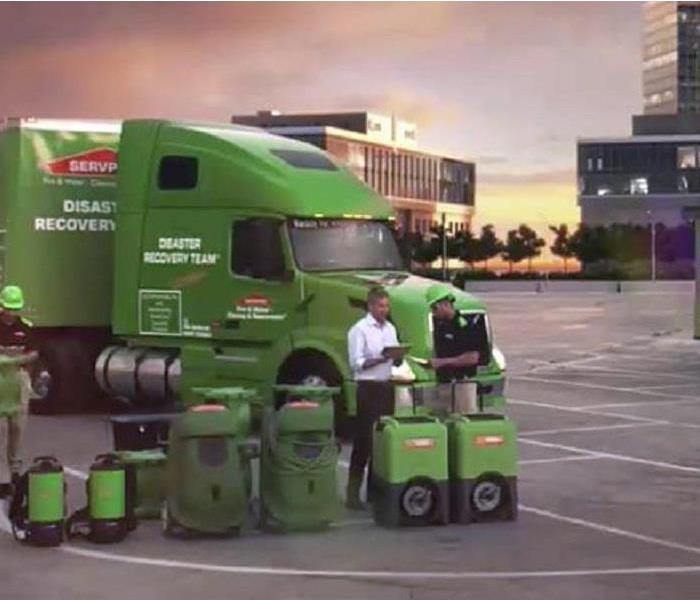 Our highly trained crews are ready to respond 24/7 to storm or flood damage in Elizabeth City and the Outer Banks.
Our highly trained crews are ready to respond 24/7 to storm or flood damage in Elizabeth City and the Outer Banks.
SERVPRO of Elizabeth City, Outer Banks specializes in storm and flood damage restoration. Our crews are highly trained and we use specialized equipment to restore your property to its pre-storm condition.
Faster Response
Since we are locally owned and operated, we are able to respond quicker with the right resources, which is extremely important. A fast response lessens the damage, limits further damage, and reduces the restoration cost.
Resources to Handle Floods and Storms
When storms hit Elizabeth City and the Outer Banks, we can scale our resources to handle a large storm or flooding disaster. We can access equipment and personnel from a network of 1,650 Franchises across the country and elite Disaster Recovery Teams Disaster Recovery Teams that are strategically located throughout the United States.
Have Storm or Flood Damage? Call Us Today [252-331-7889]
When Storms or Floods hit Elizabeth City/Outer Banks SERVPRO is ready!
8/31/2016 (Permalink)
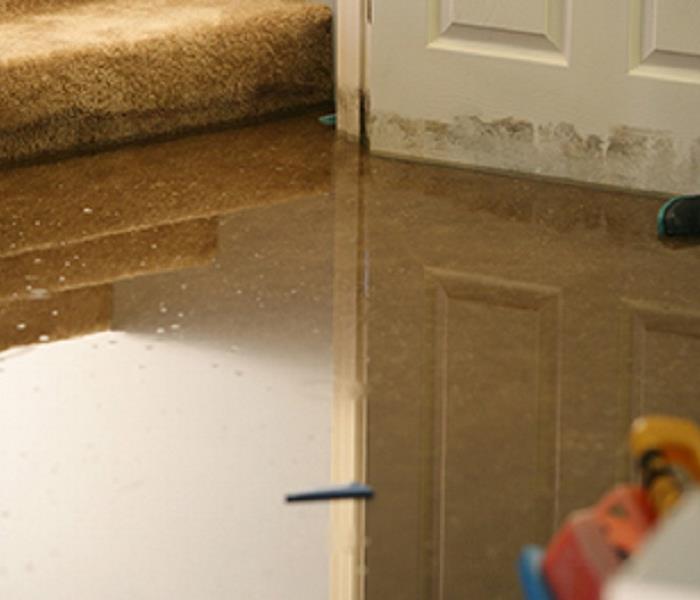 Our highly trained crews are ready to respond 24/7 to storm or flood damage in Elizabeth City/Outer Banks.
Our highly trained crews are ready to respond 24/7 to storm or flood damage in Elizabeth City/Outer Banks.
SERVPRO of Elizabeth City/Outer Banks specializes in storm and flood damage restoration. Our crews are highly trained and we use specialized equipment to restore your property to its pre-storm condition.
Faster Response
Since we are locally owned and operated, we are able to respond quicker with the right resources, which is extremely important. A fast response lessens the damage, limits further damage, and reduces the restoration cost.
Resources to Handle Floods and Storms
When storms hit Elizabeth City/Outer Banks, we can scale our resources to handle a large storm or flooding disaster. We can access equipment and personnel from a network of 1,650 Franchises across the country and elite Disaster Recovery Teams that are strategically located throughout the United States.
Have Storm or Flood Damage? Call Us Today (252)331-7889/(252)480-8557.
The Differences Between Storms
7/27/2016 (Permalink)
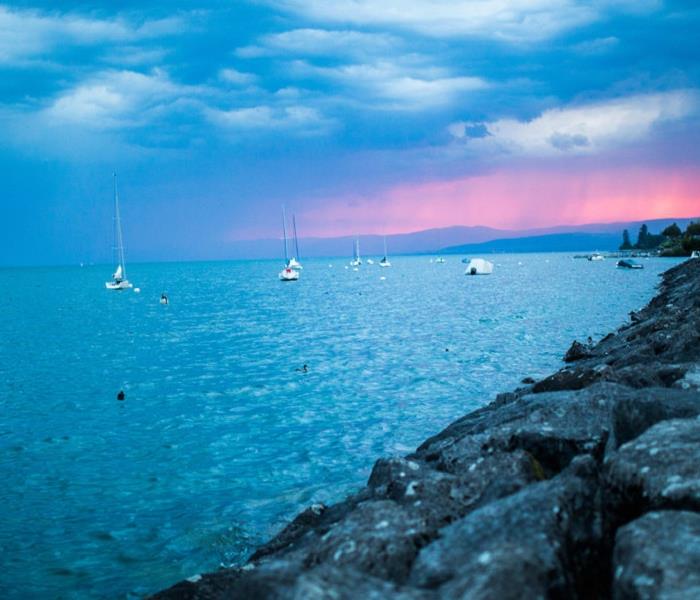 Know your storm terminology and stay safe this season!
Know your storm terminology and stay safe this season!
With hurricane season in full swing, there are a few terms that are becoming frequent on our morning weather forecasts: Tropical Depression, Tropical Storm, and Hurricane. What is the difference, and how should we react to each?
Tropical Depression
A tropical depression forms when a low pressure area is accompanied by thunderstorms that produce a circular wind flow with maximum sustained winds below 39 mph. Most tropical depressions have maximum sustained winds between 25 and 35 mph.
In the U.S., the National Hurricane Center (NHC) is responsible for issuing advisories upgrading or downgrading tropical activity.
Reconnaissance aircraft missions are sent by the NHC flying into tropical storms to gather data, like wind speeds, to aid in making these classification changes. Surface data from islands, buoys and vessels can also be used to make changes.
These systems can turn into Tropical Storms, and ultimately hurricanes or they can begin to diminish before even making landfall.
Tropical Storm
An upgrade into a tropical storm occurs when cyclonic circulation becomes more organized and maximum sustained winds gust consistently at or above 39 mph, and no higher than 73 mph. Tropical storm status is when the naming of the storm takes place.
These systems can become a problematic when they make land fall with increases in flash flooding for coastal areas.
Hurricane Classification
A tropical storm is then upgraded into Category 1 hurricane status as maximum sustained winds increase to between 74 mph and 95 mph.
The Saffir-Simpson Hurricane Scale is used to rate hurricane intensity in the Atlantic Basin. A 1-5 rating system is used, with Category 1 being a less intense storm and Category 5 very intense.
Only 3 Category 5 hurricanes have made landfall in the U.S. in the 20th and 21st century. The three Category 5 storms to hit the USA were the 1935 Florida Keys "Labor Day" hurricane, Hurricane Camille, which hit Mississippi in 1969, and Hurricane Andrew, which hit Dade County, Fla., on Aug. 24, 1992.
The most important thing to remember during hurricane season is to be prepared! Preparing now will save you from long lines at the store, and afford you effective evacuation routes. When it comes time for clean up after the storm, SERVPRO® of Elizabeth City/Outer Banks will be here to make it “Like it never even happened.”
Hurricane Preparedness in Elizabeth City/Outer Banks
7/18/2016 (Permalink)
With hurricane season upon us, it is important to be prepared. Even with advanced warnings, hurricanes can be deadly and it pays to have a plan in place. Below are some tips to get your family and home Hurricane Ready.
Supply Kits
Create a supply kit. These can be stored in large plastic totes or in a large backpack for grab and go emergencies. Keep non-perishable foods, water, flashlights, batteries, an emergency weather radio, list of emergency contact numbers, a map, and any medications that would be needed for your family and pets. For kits that can be taken on the road, include small activity books to have on hand as well.
Written Emergency Plan
Mark out locations that you and your family can evacuate to. Plan for additional areas further inland in case of a larger storm system. Create an Emergency Preparedness Plan for your business. This can be done with SERVPRO® of Elizabeth City/Outer Banks.
The most important thing to remember during hurricane season is to be prepared! Preparing now will save you from long lines at the store, and afford you effective evacuation routes. When it comes time for clean up after the storm, SERVPRO® of Elizabeth City/Outer Banks will be here to make it “Like it never even happened.”
What is Heat Lightning?
7/1/2016 (Permalink)
With summer comes summer storms and who hasn’t seen heat lightning flashing along the horizon on a muggy evening. But what is heat lighting, and is it dangerous?
What is Heat Lightning?
Sometimes during a storm, you can see lightning strike, but cannot hear the thunder as there is large distance between you and the storm. This is known as heat lightning. As there is no audible sound of thunder, the lightning is just seen as a flash of light.
As the lightning takes place far away, the sound waves get dispersed while traveling and do not reach the observer. Heat lightning is nothing but ordinary lightning, minus the sound of thunder. It is a term used to describe flashes of light that are seen near the horizon. As light flashes can travel to a larger distance than sound waves, only the flashes of light are seen, but the thunder is not heard.
Facts about Heat Lightning
- It occurs in summers and especially on hot summer nights. Hence, it is named so.
- It is not followed by thunder and rainfall like ordinary lightning. The thunder and rainfall actually take place at a distance, and so are not observed.
- The Earth's curvature, airborne elements like snow or dust, etc., can muffle the sound of the thunder.
- Heat lightning can be seen all over the world. It is especially common in the mountainous regions.
- It is usually an indication of an approaching storm.
- Many lightning casualties occur in the summer months. But, chances of being struck by lightning can be prevented if you follow safety rules.
- Just because you cannot hear the thunder, does not mean you are not at a risk of getting struck by the lightning. Remember that light travels faster than sound.
Is Heat Lightning Dangerous?
Heat lightning is equally as dangerous as ordinary lightning. Many people enjoy watching the brilliant orange flashes of light near the horizon. But it is advised to immediately seek shelter indoors. As mentioned above, it is an indication of an invading storm, and people may not realize how close the storm is and may be under risk of getting struck by the lightning.
Lightning Safety Measures
Remember, when you see lightning, always stay indoors. If you are outdoors, it is best to stay in your car or seek shelter in nearby buildings. Avoid standing under a tree or seeking shelter in very high buildings. If you are on a hilltop, try to seek shelter as you are at a higher risk of getting struck with lightning. One should also stay away from electrical poles or telephone lines. It is even advised not to use plug-in electrical equipment for safety reasons.
If your home is damaged by storms this summer, call SERVPRO® of Elizabeth City/Outer Banks at (252)331-7889/(252)480-8557.






 24/7 Emergency Service
24/7 Emergency Service
